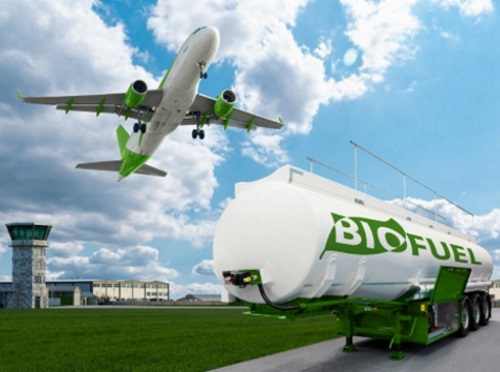The U.S. Department of Transportation and Department of Energy recently released the Sustainable Aviation Fuel Grand Challenge Roadmap as part of what they dubbed a “government-wide strategy” for scaling up sustainable aviation fuel production across the country.
[Above photo by DOE]
That roadmap – a collaboration between USDOT, DOE, the U.S. Department of Agriculture, and the Environmental Protection Agency – outlines actions designed to spur technological innovation to produce sustainable aviation fuel or SAF, reduce greenhouse gas or GHG emissions, and enable the United States to meet its domestic climate goals. It also seeks to position the United States as a “global leader” in the emerging SAF market.
Made from renewable biomass and other resources, including winter oilseed crops, agricultural and forestry residues, and municipal solid waste streams, USDOT said there is enough collectible biomass available in the U.S. to produce 50 billion to 60 billion gallons of low-carbon fuels annually.
According to a joint USDOT and DOE statement, the SAF Grand Challenge Roadmap aligns government and industry actions to achieve the three major goals of the SAF Grand Challenge outlined by those agencies in 2021:
- Achieve a minimum of a 50 percent reduction in life cycle GHG emissions compared to conventional fuel;
- Produce three billion gallons of SAF per year by 2030; and
- Supply sufficient SAF to meet 100 percent of aviation fuel demand by 2050.
USDOT noted that U.S. commercial aviation currently consumes approximately 10 percent of all transportation energy and is a significant contributor to domestic GHG emissions. SAF has the potential to deliver the performance of petroleum-based jet fuel, but with a fraction of its carbon footprint, USDOT added – adding that “emerging SAF” pathways even offer the potential for a “net-negative” GHG footprint.
State departments are engaged in similar sustainable aviation promotion efforts.
For example, on September 23, the aviation division of the Washington State Department of Transportation began accepting applications for a new airport grant program that funds sustainable aviation projects.
The agency said in a statement that such projects may include electrification of ground support equipment; electric aircraft charging infrastructure; airport clean power production; electric vehicle charging stations or fuel cell electric vehicle hydrogen stations whose infrastructure may also support ground support equipment and/or electric aircraft charging; and sustainable aviation fuel storage.

